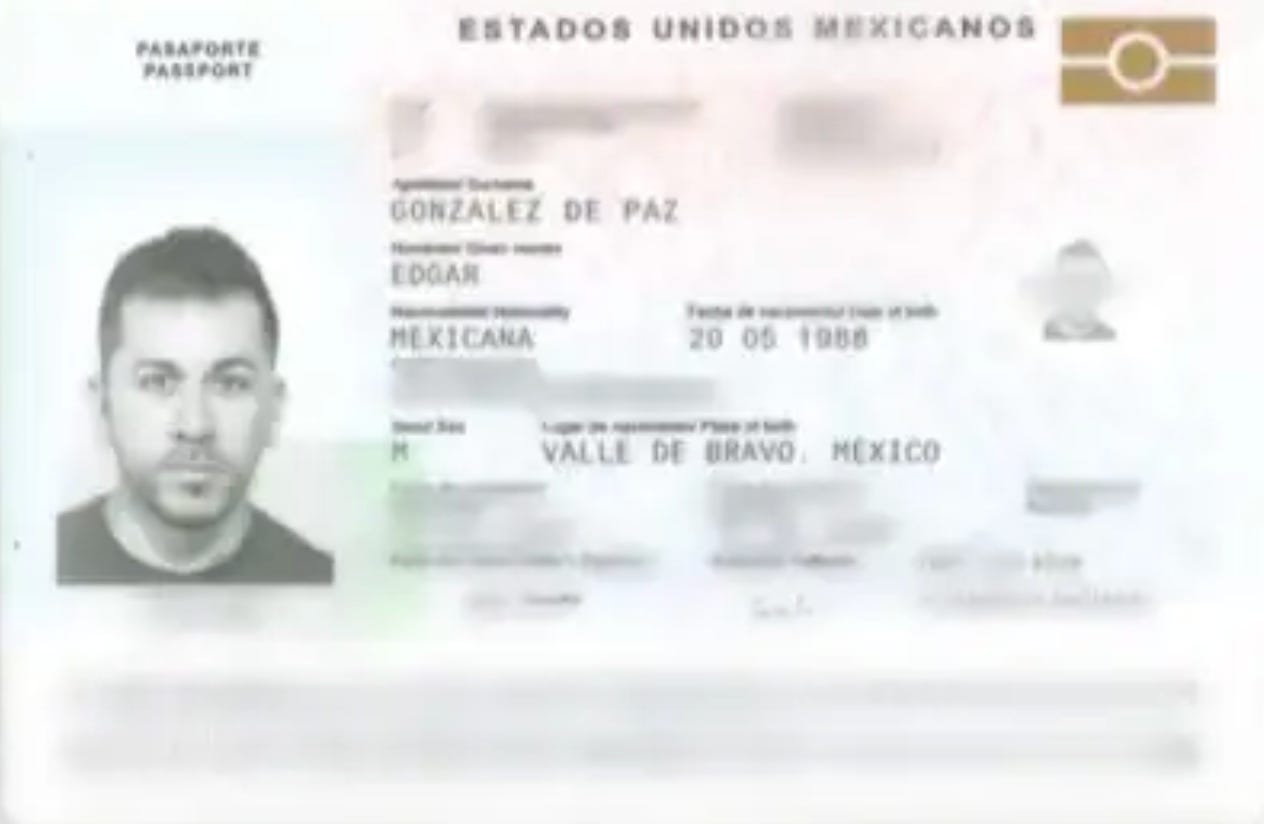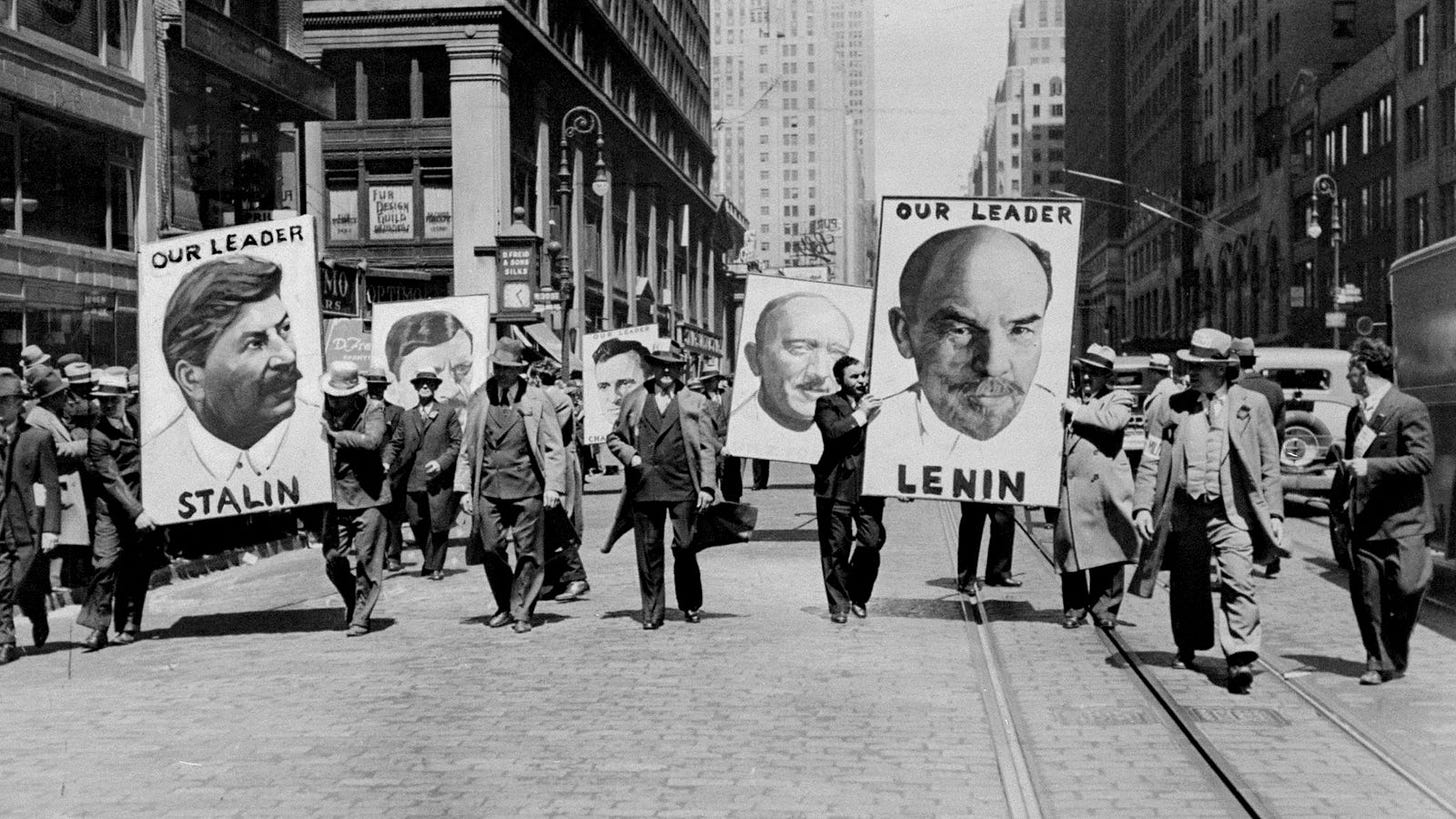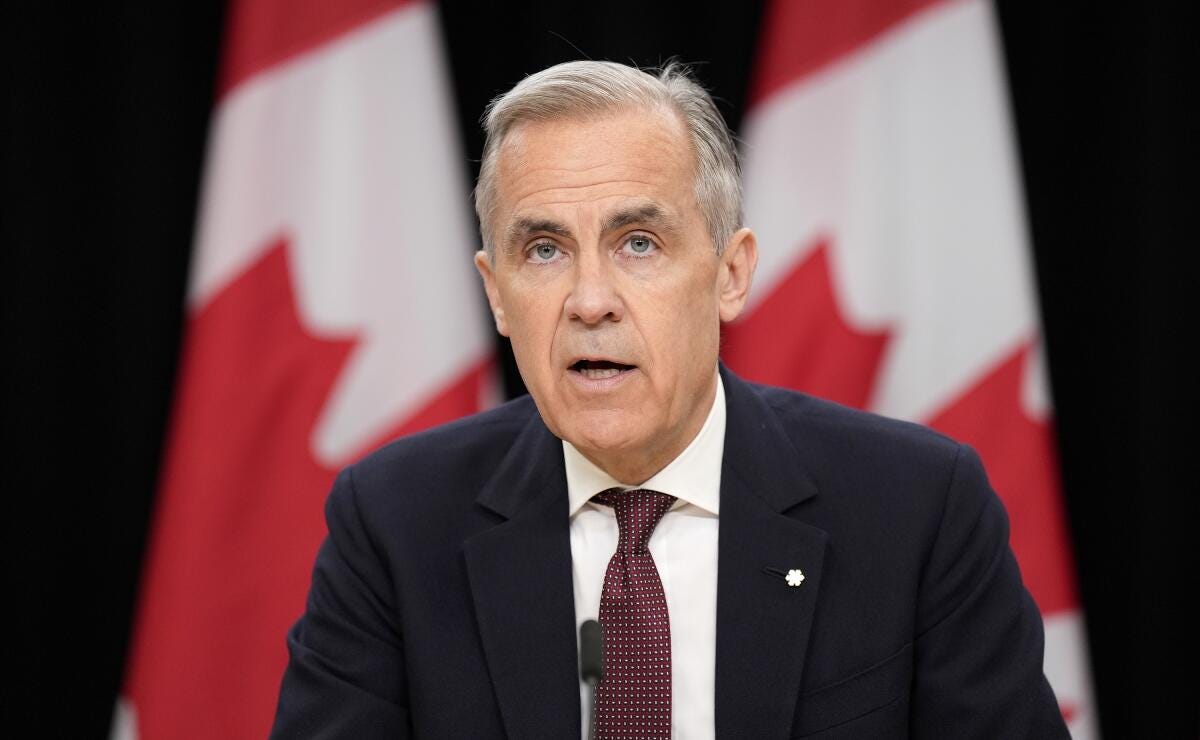Good morning, it’s Wednesday, November 12th. In today’s news, a Mexican Cartel operative pleads guilty in a Montreal human-trafficking case, America’s ‘anti-communism week’ should be a wakeup call, bureaucrats secretly push ‘free’ healthcare to foreigners as ERs overflow at home, a Mohawk man caught with a ‘killing machine’ rifle gets time served due to ‘intergenerational trauma,’ and much more.
First time reading the daily blend? Sign up here.
Mexican Cartel Operative Pleads Guilty in Montreal Human-Trafficking Case
In 2016, the Trudeau government was warned: lifting visa requirements for Mexican nationals would invite cartel-linked smugglers into Canada. The intelligence was clear. The risks were spelled out in black and white. Yet, Ottawa did it anyway — and now, nearly a decade later, the consequences are playing out in the streets of Montreal.
Last week, a Mexican national named Edgar Gonzalez de Paz pleaded guilty in a Montreal courthouse for organizing illegal crossings between Canada and the United States. Court filings describe him as a key figure in a human-trafficking and smuggling network with direct ties to Mexico-based criminal organizations. His crew charged up to $6,000 per person, ferrying migrants across the Quebec-Vermont border, raking in more than a million dollars in seven months.
Canadian investigators seized ledgers listing clients, recruiters, and U.S. collaborators — a paper trail that reads like a logistics manual for cross-border crime. Gonzalez’s condo doubled as a smuggling hub, complete with cocaine, cash, and luxury designer clothes. According to the Canada Border Services Agency, the network threatened migrants, extorted them, and left many stranded in vulnerable conditions.
This pattern emerged when the Liberals removed visa restrictions for Mexican travellers. Former CBSA officer Luc Sabourin testified that the decision opened the gates to hundreds of cartel-linked operatives. Since then, “serious crime” flags tied to Mexican nationals have surged. Border closures like Roxham Road only deepened the problem — forcing smugglers to professionalize and build new routes through Quebec’s rural communities.
Canada’s immigration and border policies are reckless. The federal government has turned the country into a convenient backdoor for organized crime, then gaslights citizens when that crime spills over. These are not poor migrants seeking opportunity; they are networks exploiting Canada’s weakness.
The result is predictable: the border is now a marketplace. The traffickers are armed. The institutions meant to protect Canadians are overwhelmed. And all of it began with a political decision that traded national security for progressive optics. Source.
Dangerous Drift: Why America’s ‘Anti-Communism Week’ Should Be a Wake-Up Call
This week, President Donald Trump issued a proclamation marking Anti-Communism Week, a solemn tribute to the more than 100 million people who have perished under communist regimes. But it’s more than just a commemoration—it’s a warning.
In his proclamation, Trump reminded the world of the devastation communism has wrought since Vladimir Lenin’s 1917 revolution in Russia—a movement inspired by Karl Marx’s Communist Manifesto, which promised equality but delivered oppression, famine, and death. From the gulags of the Soviet Union to the cultural purges of Mao’s China, communism’s defining features have remained constant: the destruction of family, the suppression of faith, and the abolition of individual freedom.
“New voices now repeat old lies,” Trump warned, “cloaking them in the language of ‘social justice’ and ‘democratic socialism.’ Yet their message remains the same: give up your freedom, place your trust in government, and trade prosperity for control.”
It’s a chilling reminder that tyranny rarely marches in under its true name. Today, many of the same collectivist ideas that devastated nations in the 20th century are being rebranded and repackaged across the Western world—often under the banner of “equity,” “climate justice,” or “inclusion.” These concepts may sound benign, but their practical outcome is always the same: more power for the state, less freedom for the individual.
At rallies like the “No Kings” protests in Washington and during the Democratic National Convention in Chicago, banners promoting communist slogans and calls to abolish private property have become increasingly visible. What was once unthinkable in the free world—open advocacy for communist principles—is now tolerated, even encouraged, in many corners of Western politics and academia.
Today, roughly 1.5 billion people still live under communist regimes—in China, Cuba, Laos, North Korea, and Vietnam. In these countries, dissent is crushed, religion is outlawed, and basic human rights are routinely violated. The Chinese Communist Party continues to operate the world’s largest surveillance state, committing atrocities such as forced organ harvesting and religious persecution, all while infiltrating Western institutions through propaganda and disinformation campaigns.
Communism has always promised liberation but only ever delivered obedience.
Trump’s proclamation reaffirms that the United States “rejects this evil doctrine” and stands by its founding principles of liberty and individual dignity. He concluded:
“We honour the victims of oppression by keeping their cause alive, and ensuring that communism, and every system that denies the rights to life, liberty, and the pursuit of happiness, finds its place on the ash heap of history.”
The warning is clear: as Western nations inch further toward centralized power, censorship, and control—often in the name of progress—they risk forgetting the lessons written in the blood of the last century.
Communism doesn’t need to arrive through revolution anymore. It creeps in quietly through cultural manipulation, government overreach, and the slow erosion of individual rights.
Those who still believe freedom is guaranteed in the West would do well to remember: it only takes one generation to forget what tyranny looks like.
Bureaucrats Secretly Push “Free” Healthcare to Foreigners as ERs Overflow at Home
When a government tells its own employees to stop saying what everyone already knows, it usually means the truth has become inconvenient. That’s what happened inside Canada’s immigration department, where staff were told to avoid describing healthcare as “free” in ads targeting foreigners—after the department had already run one that did.
The directive came months before the controversy broke. Internal emails show Immigration, Refugees and Citizenship Canada (IRCC) staff were explicitly warned against using the word “free” due to “sensitivities around promoting that newcomer services are ‘free.’” In other words, they were told to hide the cost—because Canadians are starting to feel it.
The irony is that the ad was right in one sense: newcomers don’t pay directly. But Canadians do. Every visit to the doctor, every emergency-room wait, every surgical delay, is being funded by taxpayers who are paying record taxes for a system ranked near the bottom among developed nations. According to the Fraser Institute, Canada now ranks 28th out of 29 countries with universal healthcare systems—despite being one of the biggest spenders. It has among the longest surgical wait times in the developed world and some of the fewest physicians per capita.
This is what “free” looks like: 6.5 million Canadians without a family doctor, median wait times of 30 weeks between referral and specialist consultation, and hospitals so overcrowded that patients are treated in hallways. Yet Ottawa’s immigration ads are telling foreigners that healthcare here is free.
The government’s instinct wasn’t to fix the problem—it was to change the language. That’s the modern bureaucratic reflex: manage perception, not reality. When the public grows angry about decaying systems, Ottawa doesn’t reform them—it rebrands them. The truth becomes a communications issue to be handled by “messaging,” not policy.
Canada’s healthcare system isn’t free. It’s expensive, inefficient, and failing. But it’s also one of the last remaining public institutions that Canadians still believe in, which is why the government can’t afford to let the illusion fade.
The word “free” has now joined a growing list of banned words in Canada’s bureaucratic lexicon. Not because it’s false, but because it reminds people that the system they’re paying for no longer works. Source.
Two-Tiered Justice: Mohawk Man Caught with ‘Killing Machine’ Rifle Gets Time Served Due to Intergenerational Trauma
A Mohawk man, Jesse Garlow, who was caught driving with a crack pipe, a modified rifle described as a “killing machine,” and a flamethrower, was sentenced to time served after 516 days in pre-trial custody. Ontario’s Court of Justice cited systemic and intergenerational trauma, noting Garlow’s tragic upbringing and the harsh conditions he endured in custody. While prosecutors had recommended 3.5 years, Justice Brenda Green granted a suspended sentence and three years’ probation, emphasizing the need to consider Indigenous offenders’ unique circumstances under Gladue principles. More
Canada’s justice system continues to expose a dangerous double standard: a two-tiered system where intergenerational trauma and systemic factors can lead to minimal consequences for serious crimes, while ordinary Canadians face harsh, unyielding punishment for far lesser offences. Cases like Garlow’s illustrate how the law can bend under one set of circumstances yet remain rigid under another, leaving citizens questioning whether justice is truly blind—or only selectively applied. This fractured approach not only undermines public confidence in the courts but also fuels a perception that some are above the rules while others bear the full weight of an inflexible system. It’s a warning that Canada’s justice framework is no longer consistent, fair, or capable of ensuring equal protection for all.
101 Missing Children in Memphis Rescued by US Marshals
The US Marshals Service has located and safely returned 101 missing children in Memphis, Tennessee, after a 40-day operation conducted in partnership with local and state authorities. The mission is part of a broader federal effort to curb violent crime in Memphis—one of America’s most dangerous cities. Earlier this year, federal agents rescued about 80 missing children and arrested more than 1,700 suspects, including 126 gang members, under a Justice Department initiative to combat gang activity and human trafficking.
In September, President Donald Trump authorized the deployment of the National Guard and a multi-agency task force—including the FBI, DEA, ICE, and US Marshals—to reinforce those efforts, citing Memphis’s nation-leading homicide rate of 40.6 per 100,000 residents in 2024.
Local officials later reported significant drops in crime, saying Memphis had reached a 25-year low in robberies, burglaries, and larcenies, and a six-year low in homicides. While the city credited community programs and policing strategies for the progress, the timing coincided with the federal crackdown—suggesting the combined approach may be working. More
Canadians Travelling to Europe Will Face New Digital Tracking Requirements - By April, Europe’s fully digital Entry/Exit System (EES) will be operational, monitoring entries, exits, overstays, and denied entries.
‘Entirely Political’: Istanbul Mayor and Erdoğan Rival Faces 142 Charges, Potentially 2,000 Years in Prison - Ekrem İmamoğlu, the main political opponent of Turkish President Erdoğan, has been accused of bribery, extortion, and other offenses in what critics call a politically motivated case. More
Peace Deal Between Thailand and Cambodia Breaks Down After Border Landmine Explosion - More
Iran Wants ‘Peaceful’ Nuclear Agreement With US, Deputy Foreign Minister Says - More
Modi Condemns Terror Attack in India That Killed 11, Vows ‘Those Behind the Blast Will Not Be Spared’ - More
Houthis Indicate End to Red Sea and Israel Attacks Following US-Brokered Gaza Cease-Fire - More
Economists Warn: Canada Is On the Brink of a Recession
Canada faces a growing risk of recession within the next six months, according to the Bank of Canada’s latest Market Participants Survey. Business and financial leaders estimate about a 35% chance the country is already in—or will soon enter—a technical recession, defined as two consecutive quarters of negative GDP growth.
Survey respondents painted a grim picture: nearly 90% said Canada’s economy is running below potential, citing trade tensions as the biggest threat. Other risks include weaker consumer spending and a cold housing market.
Although the economy technically avoided a full recession through September, with modest third-quarter growth of 0.4%, uncertainty remains high. The Bank of Canada recently cut interest rates, but Governor Tiff Macklem warned monetary policy may have reached its limit, leaving fiscal measures and government intervention to steer the economy. More
Visa and Mastercard Settle 20-Year Antitrust Lawsuit for $30 Billion - The settlement will lower swipe fees and give merchants more control over which cards they accept—putting some rewards cards at risk of denial. More
SoftBank’s $5.8 Billion Nvidia Stock Dump Stirs Fresh AI Bubble Fears - More
Water Can Form Naturally During Planet Formation, Raising Hopes for More Habitable Worlds
New research shows that water can form naturally during a planet’s formation, not just arrive via comets or asteroids. High-pressure, high-temperature lab experiments simulating molten rock interacting with hydrogen gas revealed that chemical reactions produce significant amounts of water, suggesting that life-sustaining water may be a common byproduct of planet formation throughout the galaxy.
These findings suggest that habitable worlds could be far more common than previously thought. If water can form naturally during the early stages of planet formation, then rocky planets and sub-Neptunes across the galaxy may routinely develop oceans and other water reservoirs. This increases the likelihood of environments capable of supporting life, meaning that planets with the right conditions for habitability (in the Goldilocks Zone) might not be rare cosmic flukes, but a natural outcome of how planets form. More
Scientists Reveal a Clever Trick to Help Win Rock, Paper, Scissors - Scientists revealed that the best strategy for winning multiple rounds of rock, paper, scissors is to be completely random and unpredictable, ignoring what happened in previous rounds. More
Eight Arrested, Over 1,000 Suspended in Massive Turkish Football League Gambling Scandal
Eight people, including Eyupspor Chairman Murat Ozkaya, have been arrested in Turkiye amid a sweeping investigation into football betting and match-fixing, while more than 1,000 players have been suspended pending disciplinary action. Among those suspended are 27 top-tier Super Lig players, including Galatasaray defender and Turkish national team member Eren Elmali, whose suspension is linked to a bet from five years ago. The scandal erupted after the Turkish Football Federation (TFF) discovered that 371 of 571 active referees held betting accounts, with some placing thousands of bets. Lower-division leagues, where most implicated players compete, have been suspended for two weeks as investigations continue. More
NCAA Agrees to $303 Million Settlement with Volunteer Coaches - Under the settlement, roughly 7,700 coaches will receive an average of $39,200 each before fees and expenses. More
Cleto Escobedo III, Jimmy Kimmel’s Bandleader, Dies at 59 - More
Man Snaps 65 Cucumbers in 30 Seconds to Break World Record…I was just shocked to learn they actually held a record for this.
“Mellon Blue” 9.5-Carat Pear-Shaped Diamond Sells for $25.6 Million at Swiss Auction
On This Day in 1990, the World Wide Web Is Born - CERN computer scientists Tim Berners-Lee and Robert Cailliau put forward the first proposal for what would become the World Wide Web, revolutionizing how the world shares information forever.


















